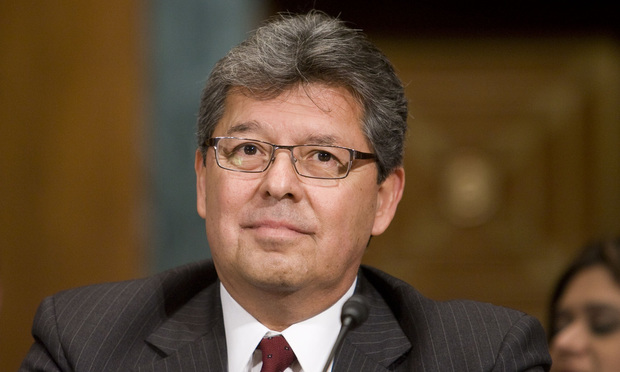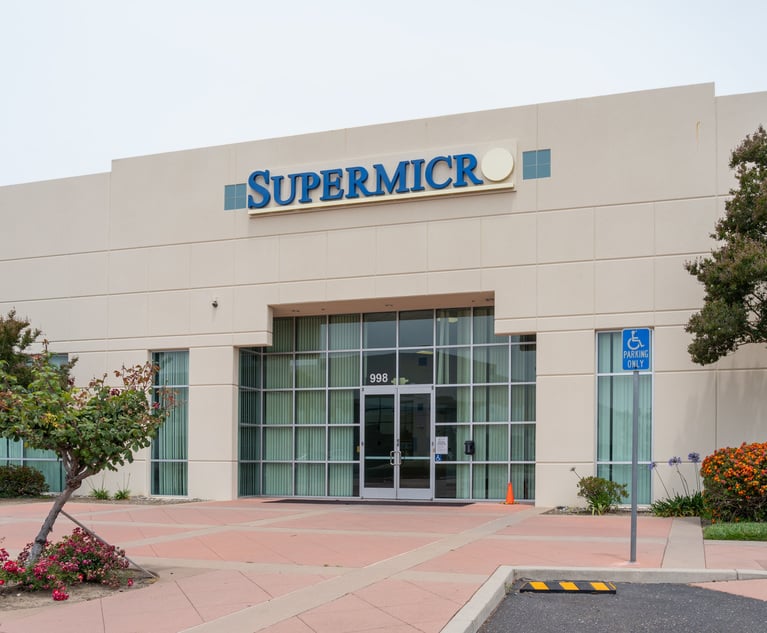Judge Disappointed Over Sanctions in Alleged Apple iPhone Throttling Case
"The remedy here—I think it's a good remedy—is remove those two counsel,” said Judge Edward Davila of the Northern District of California.
May 30, 2019 at 05:32 PM
5 minute read
 Edward J. Davila. Photo: Diego M. Radzinschi/ALM
Edward J. Davila. Photo: Diego M. Radzinschi/ALM
A federal judge in California said he was troubled to find some of the “best lawyers in the country” arguing for serious sanctions in his San Jose courtroom, when they should be litigating Apple's alleged throttling of older iPhones.
Lawyers representing the tech giant have requested the interim co-lead counsel in the multidistrict litigation be removed over a “blatant and very serious violation” of a protective order that occurred during a motion to dismiss hearing.
“The remedy here—I think it's a good remedy—is remove those two counsel,” said U.S. District Judge Edward Davila of the Northern District of California. “That would be the strongest remedy we can take, and I don't think we'd have a problem. Hopefully that imparts the disappointment of the court that we've taken my valuable, precious time in looking at this issue that was completely unnecessary.”
On March 7, Cotchett, Pitre & McCarthy principals Joseph Cotchett and Mark Molumphy, representing a class of iPhone users, read from documents labeled “highly confidential—attorneys' eyes only.” Both parties agreed to notify the court before citing confidential materials under an Oct. 15 protective order that covers a large portion of the roughly 7 million documents Apple shared in the case.
The class action seeks damages for Apple users after the company allegedly made fraudulent misrepresentations over unexpected iPhone shutdowns. Apple reportedly slowed the performance of some older devices to prevent battery shutdowns caused by a mismatch between hardware and software demands. The sealed information the Burlingame-based plaintiffs lawyers revealed in court included internal communications between Apple employees on troubleshooting, potential action plans for the battery issue and “negative comments,” according to the motion.
Apple attorney Theodore Boutrous, of Gibson, Dunn & Crutcher in Los Angeles, cited a decision by U.S. District Judge William H. Alsup when he presided over Oracle v. Google in the Northern District of California. Boutrous said that Alsup noted it was a long tradition to first explain a restriction to a judge, even without a protective order explicitly requiring it. “Everybody knows that,” Boutrous said. “We all know you don't just start reading from protected material in open court.”
Boutrous also argued that imposing sanctions would convey the gravity of the offense and how it could have comprised the privacy of Apple employees and users. “We think the court needs to send a strong message not just for this case, but for all cases, that parties cannot just blurt out protected information and leave the court to decide what's protected or not,” he said.
Within the first minute of Cotchett's argument, he began once again citing a part of the transcript that mentioned protected material, which brought the opposing side to their feet. Davila told him to refrain from reading any sealed documents.
Cotchett called the sanctions “silliness,” after writing Apple was manufacturing controversy in a joint opposition, and claimed he told Christopher Chorba, another Gibson Dunn partner, that he planned to read from his declaration, that contained protected documents. “He looked at me, and he didn't say a word,” he said.
In addition to alerting Davila that he was about to read from his declaration, which was labeled under seal, Crotchett said both his team and Chorba cited confidential information during the first 22 minutes without notifying the court. “I really don't know why we're here today, and why this shouldn't be resolved in front of a discovery referee,” he said. “I don't think we did anything wrong, and I don't think they did anything wrong.”
Crotchett questioned the harm as a result of reading from the sealed documents. “Did I read anything in The New York Times?”
In rebuttal, Chorba said he addressed protected documents to set the record straight after Molumphy mischaracterized information.
Molumphy said this is not a misunderstanding of the protective order but a “difference of understanding” in providing sufficient notice of disclosing sealed information.
The problem, Davila said, was though everyone else in the room knew confidential information was being discussed, he might not have, and the protected order is an avenue to inform the court, so that he could make a decision to close the session or take a recess to read the documents and assign a crypted nomenclature.
“Was this a difference of understanding of the rules of the [protected order] so confusing that all your great minds couldn't follow it even though you drafted it?” he said. “I will express some dismay and disappointed with not hearing Mozart with this motion, it's probably closer to Lynyrd Skynyrd, it's somewhat discordant.”
Davila said he would consider the request for sanctions and respond with an order shortly.
As people began filing out of the courtroom, Cotchett and Boutrous shook hands, Cotchett sealing the gesture with a pat on the arm, and told each other “good job.”
This content has been archived. It is available through our partners, LexisNexis® and Bloomberg Law.
To view this content, please continue to their sites.
Not a Lexis Subscriber?
Subscribe Now
Not a Bloomberg Law Subscriber?
Subscribe Now
NOT FOR REPRINT
© 2025 ALM Global, LLC, All Rights Reserved. Request academic re-use from www.copyright.com. All other uses, submit a request to [email protected]. For more information visit Asset & Logo Licensing.
You Might Like
View All
California Walnut Grower and German Investment Firm Vie for Lead Plaintiff Status in Super Micro Securities Action

Apple Files Appeal to DC Circuit Aiming to Intervene in Google Search Monopoly Case
3 minute read

Trending Stories
- 1Uber Files RICO Suit Against Plaintiff-Side Firms Alleging Fraudulent Injury Claims
- 2The Law Firm Disrupted: Scrutinizing the Elephant More Than the Mouse
- 3Inherent Diminished Value Damages Unavailable to 3rd-Party Claimants, Court Says
- 4Pa. Defense Firm Sued by Client Over Ex-Eagles Player's $43.5M Med Mal Win
- 5Losses Mount at Morris Manning, but Departing Ex-Chair Stays Bullish About His Old Firm's Future
Who Got The Work
J. Brugh Lower of Gibbons has entered an appearance for industrial equipment supplier Devco Corporation in a pending trademark infringement lawsuit. The suit, accusing the defendant of selling knock-off Graco products, was filed Dec. 18 in New Jersey District Court by Rivkin Radler on behalf of Graco Inc. and Graco Minnesota. The case, assigned to U.S. District Judge Zahid N. Quraishi, is 3:24-cv-11294, Graco Inc. et al v. Devco Corporation.
Who Got The Work
Rebecca Maller-Stein and Kent A. Yalowitz of Arnold & Porter Kaye Scholer have entered their appearances for Hanaco Venture Capital and its executives, Lior Prosor and David Frankel, in a pending securities lawsuit. The action, filed on Dec. 24 in New York Southern District Court by Zell, Aron & Co. on behalf of Goldeneye Advisors, accuses the defendants of negligently and fraudulently managing the plaintiff's $1 million investment. The case, assigned to U.S. District Judge Vernon S. Broderick, is 1:24-cv-09918, Goldeneye Advisors, LLC v. Hanaco Venture Capital, Ltd. et al.
Who Got The Work
Attorneys from A&O Shearman has stepped in as defense counsel for Toronto-Dominion Bank and other defendants in a pending securities class action. The suit, filed Dec. 11 in New York Southern District Court by Bleichmar Fonti & Auld, accuses the defendants of concealing the bank's 'pervasive' deficiencies in regards to its compliance with the Bank Secrecy Act and the quality of its anti-money laundering controls. The case, assigned to U.S. District Judge Arun Subramanian, is 1:24-cv-09445, Gonzalez v. The Toronto-Dominion Bank et al.
Who Got The Work
Crown Castle International, a Pennsylvania company providing shared communications infrastructure, has turned to Luke D. Wolf of Gordon Rees Scully Mansukhani to fend off a pending breach-of-contract lawsuit. The court action, filed Nov. 25 in Michigan Eastern District Court by Hooper Hathaway PC on behalf of The Town Residences LLC, accuses Crown Castle of failing to transfer approximately $30,000 in utility payments from T-Mobile in breach of a roof-top lease and assignment agreement. The case, assigned to U.S. District Judge Susan K. Declercq, is 2:24-cv-13131, The Town Residences LLC v. T-Mobile US, Inc. et al.
Who Got The Work
Wilfred P. Coronato and Daniel M. Schwartz of McCarter & English have stepped in as defense counsel to Electrolux Home Products Inc. in a pending product liability lawsuit. The court action, filed Nov. 26 in New York Eastern District Court by Poulos Lopiccolo PC and Nagel Rice LLP on behalf of David Stern, alleges that the defendant's refrigerators’ drawers and shelving repeatedly break and fall apart within months after purchase. The case, assigned to U.S. District Judge Joan M. Azrack, is 2:24-cv-08204, Stern v. Electrolux Home Products, Inc.
Featured Firms
Law Offices of Gary Martin Hays & Associates, P.C.
(470) 294-1674
Law Offices of Mark E. Salomone
(857) 444-6468
Smith & Hassler
(713) 739-1250






